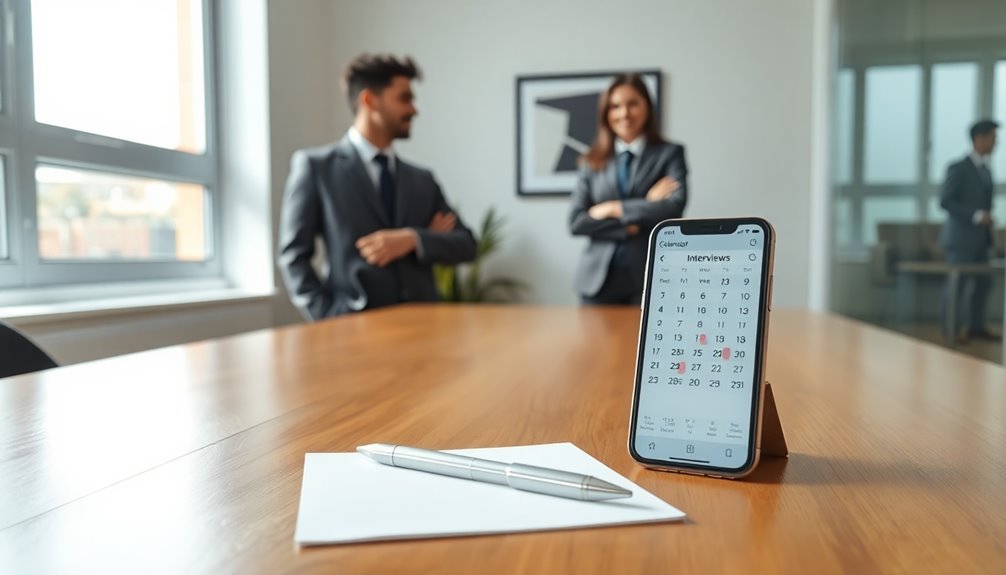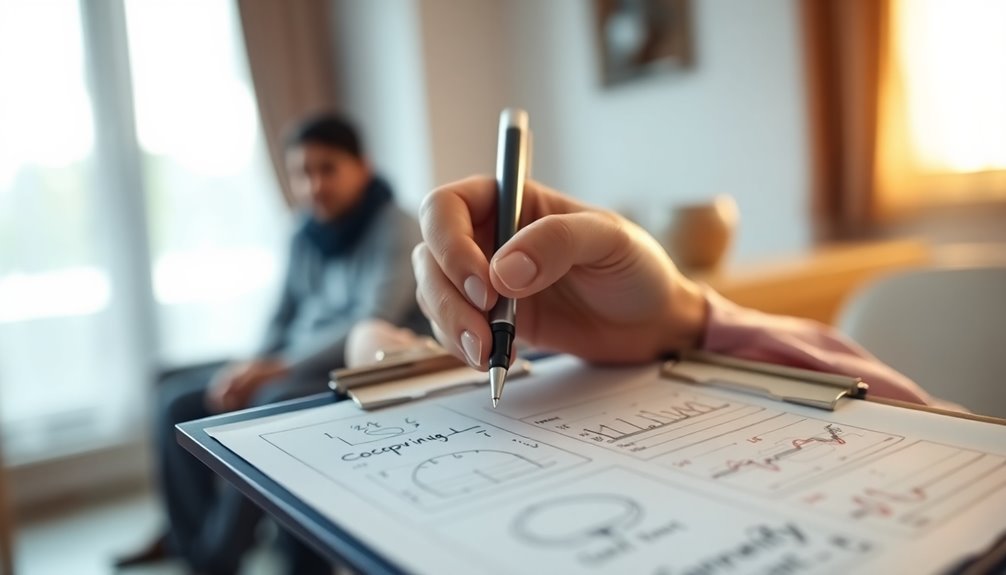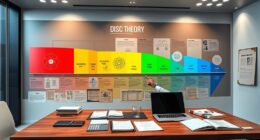Mastering the interview journey is vital for landing your dream job. Start by understanding the different stages of the process, like initial screenings and skills assessments. Prepare thoroughly by researching the company culture and practicing common interview questions with relevant anecdotes. On the big day, dress appropriately and arrive early to make a positive impression. After the interview, don't forget to follow up with a thank-you note, reinforcing your interest in the position. These essential steps will set you apart as a candidate. Stick around to explore even more tips and strategies for interview success!
Key Takeaways
- Research the company culture and values to tailor your responses and demonstrate alignment during the interview.
- Prepare and practice answers to common interview questions, including anecdotes to showcase your skills.
- Dress appropriately for the company environment to make a positive first impression.
- Arrive 15 minutes early to the interview to show professionalism and reduce anxiety.
- Follow up with a thank-you note to express gratitude, reinforce interest, and clarify any points discussed.
Understanding Job Interviews

Job interviews are a crucial part of the hiring process, typically consisting of multiple rounds that assess your qualifications and fit for the company. They serve as a meeting point between you and the interviewer, where you'll showcase your skills and learn about the organization.
Interviews can happen in various formats—face-to-face, over the phone, or via video conferencing—allowing flexibility in today's job market. You'll often face 2-3 rounds before a final decision is reached. Each stage offers a chance for both you and the employer to evaluate compatibility and expectations.
Understanding the purpose and structure of interviews can empower you, enabling you to prepare effectively and present yourself confidently.
Stages of the Interview Process

The interview process consists of several key stages that help both you and the employer determine if there's a mutual fit.
First, you'll likely go through a screening, a brief chat to evaluate your basic qualifications.
Next, the first interview digs deeper into your skills and cultural fit. If you impress, a second interview often follows, where you meet department heads and tour the facilities.
A third interview may involve final discussions and introductions to potential coworkers.
Finally, if you're selected, you'll receive a job offer, contingent on a background check and references.
Each stage builds on the last, allowing both you and the employer to assess compatibility throughout the journey.
Effective Preparation Strategies
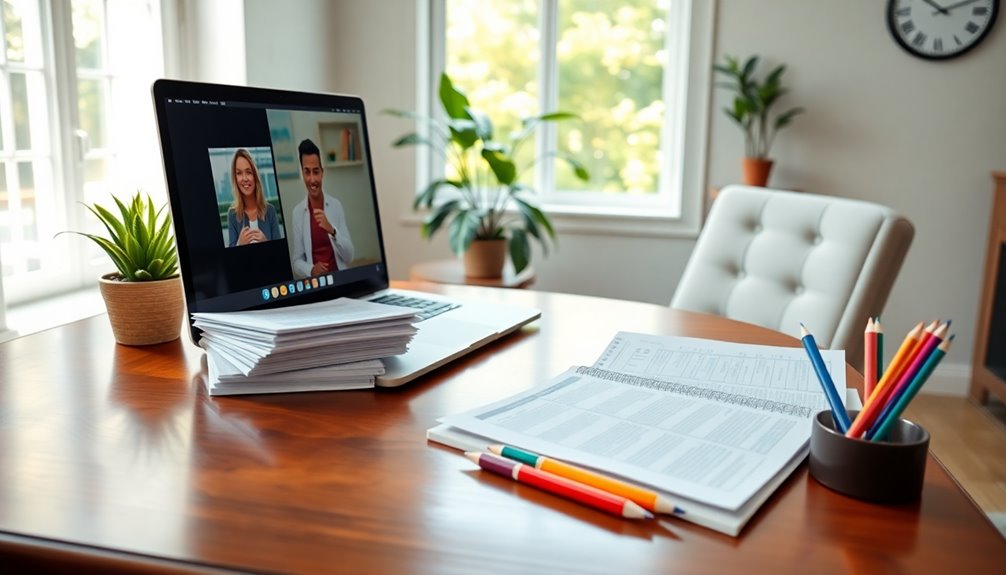
Effective preparation strategies play an essential role in setting you up for success during the interview journey. Start by researching the company and its culture to align your responses with their values.
Create a list of key points and questions you want to discuss, which not only shows your interest but also helps you stay focused. Practice your answers to common interview questions, incorporating relevant anecdotes that highlight your skills.
Don't forget to prepare thoughtful questions for the interviewer, demonstrating your engagement. Organize your materials, including extra copies of your resume and a notepad for notes.
Finally, aim to arrive 15 minutes early to show professionalism and give yourself time to relax before the interview begins.
Professional Presentation Tips

Presentation plays an essential role in how you're perceived during an interview. To make a positive impression, focus on your appearance, body language, and materials. Dress professionally to align with the company culture, and guarantee your posture conveys confidence. Arriving 15 minutes early shows your commitment.
Here's a quick checklist to enhance your professional presentation:
| Tip | Description | Importance |
|---|---|---|
| Dress Appropriately | Choose attire that fits the company culture | First impressions matter |
| Maintain Eye Contact | Engage with your interviewer | Builds trust and connection |
| Organize Materials | Keep your resume and notes in order | Avoids confusion during discussion |
| Practice Your Introduction | Prepare a concise self-introduction | Sets the tone for the interview |
| Arrive Early | Aim for 15 minutes ahead of time | Demonstrates professionalism |
Additionally, ensure that you have the right materials on hand, such as a portfolio or work samples, to showcase your qualifications effectively.
Key Interview Components

Mastering key interview components can greatly enhance your chances of success. Start with a strong introduction; your posture, eye contact, and handshake create an immediate impression.
During the interview, expect questions that assess your skills and fit for the role. This part typically lasts around 20 minutes, so be prepared with thoughtful responses. Remember to ask your own questions; this shows your interest and research about the company. Demonstrating strong communication skills can significantly enhance your clarity and rapport with the interviewer.
As you conclude the interview, restate your enthusiasm for the position and thank the interviewer sincerely. These components not only demonstrate your professionalism but also help you stand out among other candidates.
With careful attention to these details, you'll position yourself as a strong contender for the job.
Importance of Follow-Up
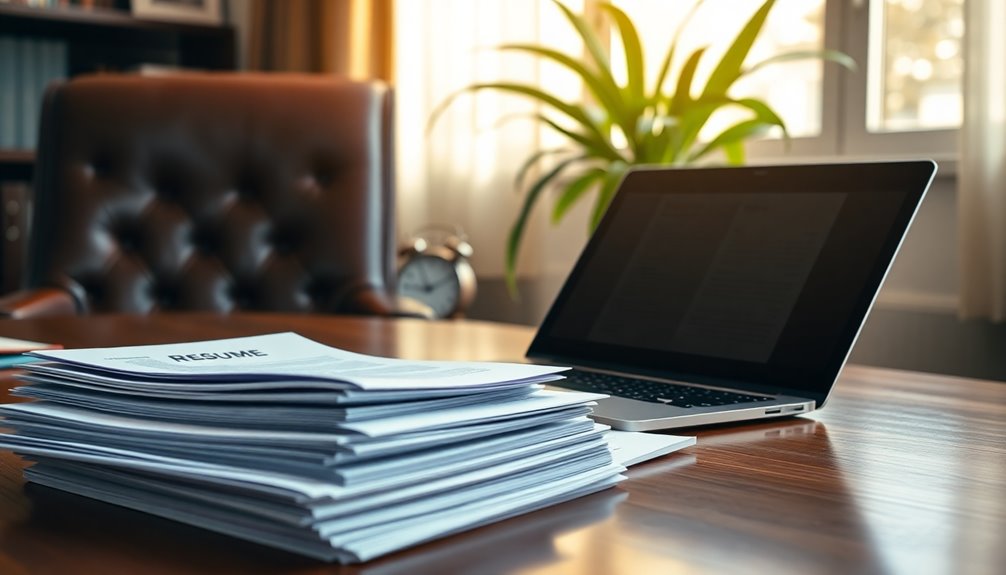
Following up after an interview is a vital step in the hiring process that can set you apart from other candidates. It shows your professionalism, reinforces your interest in the position, and keeps you top-of-mind for the hiring team.
A well-crafted follow-up can strengthen the impression you made during the interview.
Here are three key reasons why follow-up matters:
- Express Gratitude: Thank the interviewer for their time and insights.
- Reinforce Interest: Restate your enthusiasm for the role and the company.
- Address Concerns: Clarify any points from the interview that may need further explanation.
Additional Resources for Success

Exploring additional resources can greatly enhance your interview preparation and overall success.
Consider diving into articles focused on specific industries like advertising or construction certifications to better understand the field's nuances. Utilize templates that guide you in crafting professional documents, including resumes and cover letters.
Learning about competitive strategies can give you an edge, while independent skills can make you a more versatile candidate. Additionally, familiarize yourself with the roles of Subject Matter Experts to better grasp industry expectations.
Finally, don't underestimate the value of networking; connecting with professionals can provide insights and tips that are invaluable for your interview journey.
Embrace these resources, and you'll feel more confident and prepared when the big day arrives.
Frequently Asked Questions
What Common Mistakes Should Candidates Avoid During Interviews?
During interviews, you should avoid common mistakes that can jeopardize your chances.
Don't show up unprepared; research the company and practice your responses.
Avoid speaking negatively about previous employers, as it raises red flags.
Refrain from rambling; keep your answers concise and relevant.
Don't neglect your body language; maintain eye contact and a firm handshake.
Finally, avoid asking about salary or benefits too early—focus on showcasing your qualifications first.
How Can Candidates Handle Difficult Interview Questions?
When you face difficult interview questions, stay calm and take a moment to think. It's okay to ask for clarification if needed.
Use the STAR method—Situation, Task, Action, Result—to structure your responses. Focus on past experiences that highlight your strengths.
Be honest if you don't know something, but emphasize your willingness to learn.
Finally, practice active listening to guarantee you understand the question fully before answering.
What Should I Do if I'm Running Late for an Interview?
If you find yourself running late for an interview, channel your inner superhero and stay calm.
Immediately notify the interviewer via phone or email, explaining your situation and estimating your arrival time. Apologize for the inconvenience, but don't dwell on it.
Once you arrive, maintain a positive attitude. Take a deep breath, refocus, and remember that your skills still matter.
You've got this—just show them the best version of you!
How Should I Dress for a Virtual Interview?
When you're preparing for a virtual interview, dress professionally just like you'd for an in-person meeting.
Choose attire that reflects the company culture but leans towards business formal. Avoid busy patterns; solid colors work best on camera.
Make certain your surroundings are tidy and well-lit to present yourself well.
Finally, check your technology beforehand to avoid distractions, so you can focus on making a great impression during the interview.
Can I Negotiate My Job Offer After the Interview?
Absolutely, you can negotiate your job offer after the interview.
Once you receive it, take the time to review the details carefully. If you feel the salary or benefits could be improved, prepare your points and request a conversation to discuss them.
Approach the negotiation professionally, highlighting your qualifications and the value you bring.
Conclusion
As you commence your interview journey, think of yourself as a ship sailing toward your career destination. Equip yourself with the right tools—preparation, confidence, and professionalism—to navigate the unpredictable waters ahead. Each interview is a wave, presenting both challenges and opportunities. By mastering these essential steps, you'll chart a course toward success, transforming potential obstacles into stepping stones. Remember, with each handshake and conversation, you're not just showcasing your skills; you're crafting your future.
Eugene brings a fresh, dynamic voice to our platform as one of our talented Writers. Specializing in research-driven content, he explores the latest findings in psychology and personal growth, translating them into actionable insights for our readers. Eugene’s work is fueled by a curiosity about what makes us tick and a desire to help others unlock their potential.
